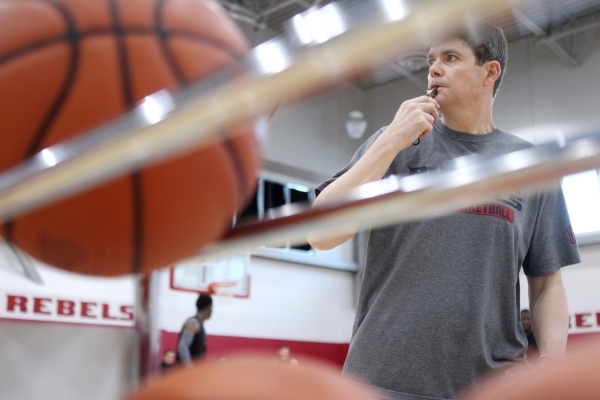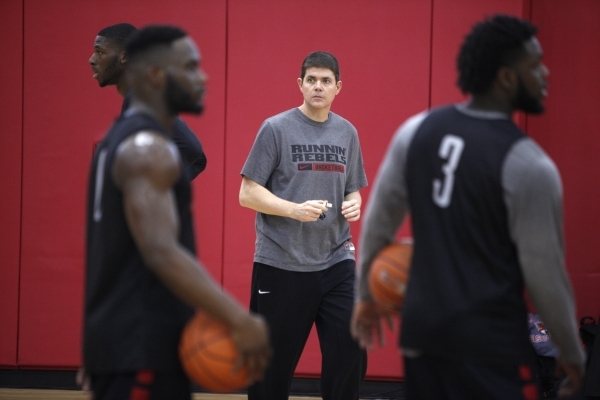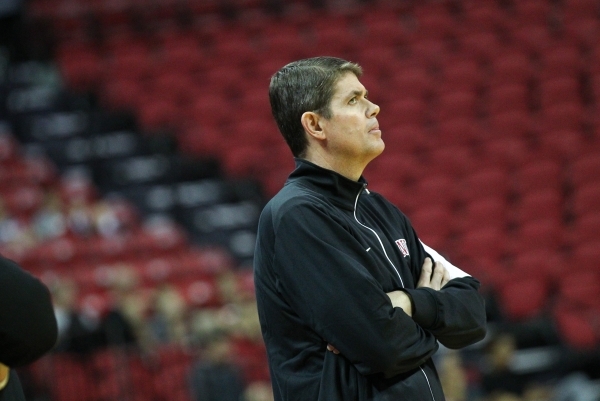Rice shouldn’t consider platooning with Rebels
You can spin the narrative all sorts of ways, and John Calipari chose a predictable route: That the use of a platoon system for Kentucky basketball last season was strictly about showcasing the talents of multiple players, that his program always will be first about those young men competing, and the fact it won 38 straight games, reached the Final Four and had seven players drafted spoke to the team's incredible success.
He has also said the platoon system was as much one-and-done as his next recruit.
Bottom line: It cost him some kids.
It's pretty difficult nowadays to find an advantage over Calipari on the court and nearly impossible in the living room, but other high major programs discovered one when recruiting against the idea of minutes being limited for one group of stars so that another could receive the same playing time.
Fact: I could convince Donald Trump he knows nothing about the economy before you could find a McDonald's All-American who is happy with playing 23 minutes a night.
Suddenly, teams with profound depth scrapped the idea of mimicking such a platoon system, and it seems Dave Rice also agrees it's not the best of strategies.
UNLV has arguably its deepest level of skill since Rice was hired as coach in 2011, and there had been some whispers over the summer that he might consider a platoon system if enough good players emerged from preseason drills.
The Rebels might ultimately showcase such talent, but it doesn't appear platooning is an option. Which is a good thing.
Which is a smart thing.
"Kentucky didn't even finish last season with the platoon system, so if a group that talented doesn't stick with it, I'm not sure who could," UNLV junior forward Ben Carter said. "I don't really believe in it. I think there should be a set rotation of guys, and then minutes come from matchups each game. Different guys have different skills sets. One game you might need a guy to stretch the floor or a bigger guy to rebound more or a point guard to facilitate more than score during a stretch. The key is adapting to what's happening on the floor.
"Everyone wants to play. Everyone wants minutes. That's why you come to a school like UNLV — to play with and against the best. Whoever earns minutes gets them, and those who don't will be right there fighting for them every day. That's what is unique about having so much depth. If you're not working hard and taking care of business, you're going to be held accountable and someone is going to take your spot."
Ben Carter ... future coach?
It's a better and more sensible way to evaluate how depth should be handled, and it's how Rice is approaching his team. He promises the Rebels will play fast at one end and press at the other, meaning how much a guy is on the court will be determined more by possessions than minutes.
It's probable the move to a 30-second shot clock from 35 this season will benefit most those defending, even though the switch was made to increase pace and scoring. But should a team such as the Rebels consistently trap or even offer a soft press to direct opponents deep into the clock, forced shots could become a trend UNLV feasts on.
UNLV has some future pros on its roster. It doesn't have the NBA haul that Kentucky annually features. Nobody does. Calipari has set himself apart on a historical level as far as producing draft picks in the past decade. Perhaps more than any other program nationally, the Wildcats best sell the idea of chasing a player's dream.
But as much as Kentucky wins, the platoon system was a mistake and certainly not a blueprint for other deep teams such as UNLV to emulate. Calipari said that the only way he could "get all his players to eat" was to platoon. He didn't feel comfortable trying to substitute 10 players in and out.
Rival programs sure felt comfortable recruiting against it.
"The biggest thing for us is that our guys understand the importance of team," Rice said. "We're going to force tempo, so it's going to come down to guys accepting and understanding their roles. How well it goes, we'll just have to see with the conditioning part of it. I know we're working hard. I know this is how we will play. I like the effort and camaraderie we've seen."
"Platoon" was a great movie. It won the Oscar for Best Picture in 1986. Oliver Stone at his finest.
Platoon as a system in which to placate college basketball depth isn't near the same level a hit. There is something to be said for the old-school way of a basic rotation, tweaked here and there based on performance and matchup and flow.
Spin it how you want. Platooning is a bad idea.
Ed Graney can be reached at egraney@reviewjournal.com or 702-383-4618. He can be a heard on "Seat and Ed" on Fox Sports 1340 from 2 p.m. to 4 p.m. Monday through Friday. Follow him: @edgraney




















